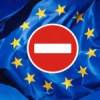EU sanctions against Ukraine no longer taboo subject

While the spectre of sanctions is becoming ever more distinct, Brussels-based analyst Amanda Paul believes that at this sensitive moment in relations between the EU and Ukraine, sanctions could be counter-productive.
The Deutsche Welle Ukrainian Service considers the possibility of sanctions being applied against those officials who spurn the principles of a law-based democracy, and looks at the experience of Ukraine’s closest neighbours – Belarus and the self-proclaimed Trans-Dniester Republic.
Sanctions were applied against 11 public officials of the Trans-Dniester Republic in 2010 over obstruction of Moldovan schools which used the Roman alphabet. The 11 people refused entry or transit through EU countries includes not only the former self-proclaimed President Igor Smirnov, but both his sons – Vladimir and Oleg. The sanctions have been extended to August 2013.
243 Belarusian nationals are currently blacklisted. The decision to ban them entry was initially taken in 2006, then extended indefinitely in 2012. The people’s names appear in two, three or even four variants, presumably to avoid tricks with passports. Those banned entry to any EU country include deputy ministers; judges; prosecutors; heads of prison colonies; deans of academic institutions; heads of the security services, media management, as well as businessmen financing Lukashenko’s regime.
The sanctions also restrict their financial movements, with their accounts and assets within the EU frozen. At present Belarusian businessmen are actively lavishing money on lobbyists who are supposed to help them get the sanctions lifted. Some have tried to appeal against the EU decision on sanctions at the European Court in Luxembourg but to no effect.
And now Ukraine …
There is now discussion about possible imposition of such sanctions against members of the Ukrainian authorities and President Yanukovych’s people. In the last few days, 20 French deputies signed a petition demanding that Rinat Akhmetov and Vadim Novinsky be banned entry to the EU. The deputies assert that these two oligarchs are the main sponsors of the Ukrainian authorities implicated in the Tymoshenko case.
Amanda Paul from the European Policy Centre says that a ban on entry to the EU and freezing of bank accounts would be a painful blow for members of the Ukrainian authorities and oligarchs if such sanctions were to be imposed. That such measures will help to change the situation in Ukraine
On the other hand she thinks it unlikely. She cites the example of Belarus where the sanctions have not changed Lukashenko’s policy.
Ms Paul added that there are probably no specific plans at present regarding sanctions with respect to Ukraine, however nobody knows what could happen at the end of this year. If the situation continues to deteriorate, then it is entirely conceivable that sanctions will be put on the agenda.
At this particular time, however, sanctions could have a totally opposite effect considering the aims which the EU hopes to achieve. She calls the current period the most decisive of any in relations between the EU and Ukraine and says that April will be a particularly important month. She adds that the EU is endeavouring to find as many allies within Ukraine as it can and imposition of sanctions would be a counter-productive step.





